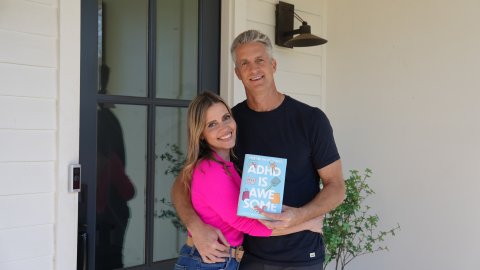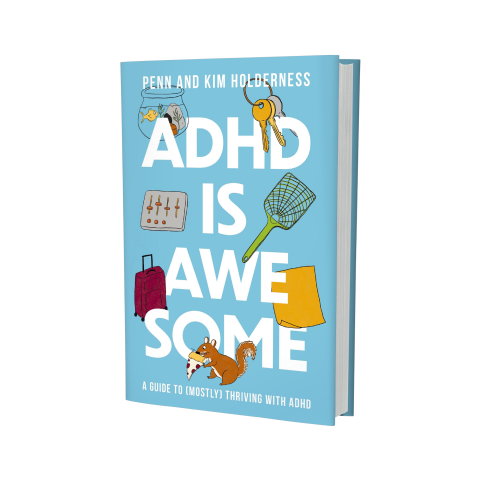Penn and Kim Holderness are widely celebrated for their entertaining viral parody videos (singing included!) on topics ranging from parenting and helping kids with homework and masking up for the pandemic (to the tune of the Hamilton soundtrack) to "stupid" healthy habits and everything in between. Now, Penn and Kim are tackling a serious subject close to their hearts in their new book, ADHD Is Awesome. It's a lively but informative dive into what the ADHD brain is and systems and strategies that neurodiverse people and their loved ones can use to make the most of their unique brain chemistry. In addition to so many practical tips, the book is as humorous as the Holderness Family videos are and reads like a love letter between Penn and Kim, modeling a relationship in which the partners value one another and work hard to strengthen those bonds. This excerpt from their book highlights things anyone can do to support a loved one with ADHD.

On a recent episode of our podcast, musician and inspirational speaker Carlos Whittaker shared a story that his dad used to tell him: if a ship sets out on a thousand-mile journey and it steers true, it will arrive at its destination. But if the navigation is off by as little as one degree, the ship will miss its mark by miles. Why am I talking about ships (aside from the fact that they seem to defy the laws of physics—a fully loaded aircraft carrier can hold 75 aircraft and 4,500 crew and weigh more than 100,000 tons...and still float!)? Life in an ADHD household is similar to navigating a long distance. A series of small miscalculations can lead you to a place far, far from where you'd hoped to be. If this is the case in your life, take heart, friends, because even if your relationship with your ADHDer is wildly off course, you can course-correct with small but effective changes.The main thing to avoid is slipping into reaction mode, where you are playing Whac-a-Mole with crises as they pop up. This can leave you frantic, out of control and incredibly tense. There is a better way.
Kim and I have friends who have an Easter tradition called the Battle of the Eggs. At the end of dinner, each family member selects one of the dyed hard-boiled eggs, turns to their neighbor at the table and knocks their egg against their neighbor's egg, trying to crack it. The last person to have an uncracked egg wins. The secret to coming out on top is to hold your egg loosely so your hand absorbs the shock. Hold the egg too firmly, and the shell shatters. When you are supporting someone with ADHD, that's what you want to aim for: a loose, comforting hold that can absorb a lot of shock.
For people who like a lot of control (which, as far as I can tell, is everyone), loosening your grip may not come naturally. We like to think that more effort, more discipline and more work have linear, positive effects on results. But how has that tight grip been working out for you? Yeah, that's what I thought. Perhaps it's time to loosen up. Here are four ways to let go of rigidity and find some ease.
1 _ Connect, Don't Correct
One of the best things you can do for your ADHDer is to connect with them. This is Kim's superpower. She is a master connector. In another life, she could have been a therapist or a minister. The most helpful thing she does—better than making sure I show up when and where I'm supposed to, better than finding my charger when I lose it, better than giving me space to be creative—is validating my feelings when ADHD makes life hard for me.
Whether I'm upset that I have blown a deadline, lost a bill or fallen over in a chair when I was leaning back in it, Kim will not say, "You should do a better job managing your time/keeping track of things/sitting."
Instead, she simply acknowledges, "Wow, that sucks." In that moment of her connecting with my feeling of suckitude, I can feel my tension (and shame) evaporating. That's the power of connection.
A quick note here: notice that Kim doesn't take on my emotional state by getting all worked up herself. Nor does she make my problem her problem. It is still on me to resolve whatever issue has arisen. It's just much, much easier to do that when I feel like Kim is standing beside me sympathetically, rather than looking at me over her glasses and tsk-tsking.
Psychiatrist Dr. Edward Hallowell wrote in Driven to Distraction: "I see the human connection as the single most powerful therapeutic force in the treatment of ADHD." That's pretty powerful. The great news is, connection is free and available to all. If you can find it in you to connect instead of correct when things get hard, it will make a world of difference.
2 _ Empathize
The cornerstone of connection is empathy. I once read about a senior care facility that made its employees wear a suit that simulated the difficulties of living with an aging body—the slower movement, trouble holding on to things, poor balance, etc. Workers who tried the suit, which limited their mobility and made it harder for them to use fine-motor skills, developed a greater appreciation for what it was like to be old. How cool is that?
If you want to know what it's like to live with ADHD, here's my best attempt at how you can simulate it for yourself. Give one or more of these scenarios a whirl:
_ Try to plan a dinner menu for four vegans who have nut, gluten and egg allergies while you perform the improv exercise of pretending to clean up after a party in a house you've never been in, all while trying to remember where the imaginary Solo cups, broom, garbage can and passed-out guests are.
_ Assemble something complicated like a new grill while simultaneously explaining the rules of baseball to someone who has never played.
_ Attempt to follow the plot of a long-form podcast, a television show and an audiobook playing all at once.
Next time you catch yourself angry-sighing at your ADHDer's symptoms, remember what it feels like to live inside a brain where expectations feel outsize.

3 _ Send Good Vibes Only
I hate fighting with my wife. I dread it with every ounce of my being, so when I sense she is getting annoyed with me, my brain gets hypervigilant, and I get testy—which obviously doesn't improve the mood around the house or my ADHD. On the very rare occasion when Kim lashes out at me for an ADHD mistake, I grouch out, which just makes my symptoms flare up. Negative feedback leads to negative feelings. When she is relaxed about her expectations of me—which, bless her, is most of the time—I am way better equipped to fulfill them.
Admittedly, it would be great if everyone in our lives would be exquisitely, immediately and cheerfully responsive to our requests. But our loved ones are not butlers (or most aren't anyway—there are approximately 12,000 people employed as butlers in the U.S., which is about 11,000 more than I would have guessed). While I totally get that it's maddening to have to ask us to do something more than once, fights about frustrations tend to have a much bigger negative impact on the situation than the annoying behaviors do.
If you are looking for a way to lessen some of the household tension that comes with living with someone with ADHD, make like Elsa and "Let It Go." Let the small stuff slide. Is it really important that your ADHDer makes his bed in the morning if your goal is to get out the door on time? Kim is an absolute champ about this. I know, for example, that clutter is like nails on a visual chalkboard to her. But instead of snapping my head off when I put my gym bag on the kitchen counter, she starts a pile of my daily clutter in the corner of the room. I know at the end of the day I have to deal with it. But the counter is cleared for her, and I take care of my own mess.
Be sure to accentuate the positive along the way. I am like a dog getting scratched behind the ear when I receive positive feedback from my family. I get a rush when Kim compliments me for something I have done, like when I wrestled the wisteria vine into submission. The promise of that praise is much more effective and keeps the household running more smoothly than if she had criticized me for letting the yard get out of hand even after she asked me to take care of it five million times.
4 _ Use Clear, Specific Imperatives for Reasonable Goals
To improve the chances that your ADHDer will be able to comply when you ask for something, you'll need to issue a clear, specific imperative in a pleasant tone. Sounds simple, right? But it's actually pretty challenging if you're accustomed to making just one request and having it fulfilled. For many ADHD brains, a broad request—"Take care of this," "Be responsible for that," "It's your turn to x," "Your job is y," etc.—is hard to translate into action. The ADHD brain responds better to a series of smaller imperatives that get directly to the point. As child psychologist Dr. Emily King said, "ADHD behaviors happen when the expectations are greater than the skills," so make sure your expectations match your ADHDer's skills.
Dr. Steven Kurtz gave the example of a parent coming into a living room to find half the inventory of a Dick's Sporting Goods store strewn about the floor. Instead of yelling, "How many times do I have to tell you to clean up after yourself?" you could wait a beat, then say, "It's kind of cluttered in here. Please put your cleats and shin guards in the mudroom." And then once that is done, say, "Great cleanup. Now, please wash your water bottle."
I get it. It's tough to be the noticer of full hampers and tall grass. At times you don't want to be the person who carries that mental load. But this is all about removing shame from the language when discussing tasks. If you set a small, reasonable goal, chances are better that your ADHDer will accomplish it, which will give them a sense of satisfaction and build their confidence.
A better life with ADHD is out there. With the right tools, information and support, you can live a wildly creative and successful life. The secret is that it's not actually ADHD that's awesome. It's you.

Adapted from ADHD Is Awesome. Copyright © 2024 Penn and Kim Holderness. Published by Harper Horizon.












